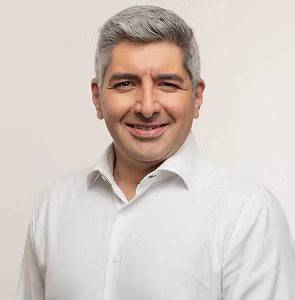The overarching theme of this episode is US President Donald Trump’s recent announcement that the country would create a bitcoin reserve—a veritable Fort Knox-style depository comprised of several select cryptocurrencies.
In our initial Spotlight segment, we’ll chat with Andrew Fei, a Hong Kong-based partner with the law firm King & Wood Mallesons, about developments in digital asset regulations in the US and what they mean for our region.
Following that, we will have a lengthier chat with the doyen of all things Bitcoin and FinTech, Henri Arslanian, in Dubai about what the Trump administration’s actions towards virtual assets will mean for the Middle East and the world more broadly, from markets and policy perspectives.
Henri Arslanian

Henri Arslanian is the co-founder and managing partner of Nine Blocks Capital Management, one of the largest institutional-grade crypto hedge funds globally and the first crypto hedge fund to be licensed by Dubai’s Virtual Asset Regulatory Authority. He is also the Host of The Future of Money podcast.
Henri is an author, speaker, educator, and arguably one of the foremost fintech experts and evangelists. He is a TEDx and global keynote speaker, a best-selling published author, and regularly featured in global media, including Bloomberg, CNBC, CNN, BBC, The Wall Street Journal, The Economist, and the Financial Times.
His first book, “The Future of Finance: The Impact of FinTech, AI, and Crypto on Financial Services” (2019), was published by Palgrave Macmillan and ranked among Amazon’s global top 10 bestsellers in financial services, in addition to being recognized as one of the “Best FinTech Books of All Time” by Bookauthority.
Henri is also an adjunct professor at HKU, where he teaches the world’s first university-level FinTech course. He advises many of the world’s leading crypto exchanges, investors, financial institutions, and tech firms on their FinTech and crypto initiatives, as well as numerous governments, regulators, and central banks on FinTech and crypto regulatory and policy matters.
He was previously PwC’s crypto leader and partner and is a former chairman of the FinTech Association of Hong Kong. Prior to joining PwC, Henri worked for a FinTech start-up and spent many years with UBS Investment Bank in Hong Kong. He started his career as a financial markets and funds lawyer in Canada and Hong Kong and speaks five languages: English, French, Armenian, Spanish, and Mandarin.
Andrew Fei
 Andrew Fei has over 15 years of experience in financial regulation, digital assets, fintech, structured finance, syndicated loans, and debt capital markets. Based in Hong Kong, he has been with the law firm of King & Wood Mallesons for a decade and is currently a partner.
Andrew Fei has over 15 years of experience in financial regulation, digital assets, fintech, structured finance, syndicated loans, and debt capital markets. Based in Hong Kong, he has been with the law firm of King & Wood Mallesons for a decade and is currently a partner.
Andrew has advised many major financial institutions, corporations, and fintech companies on a wide range of innovative cross-border tokenization and digital asset transactions, structured finance and derivatives transactions, close-out netting and collateral arrangements, syndicated financing transactions, Basel III regulatory capital instruments, securities financing transactions, financial regulatory matters, as well as digital asset-related transactions and arrangements.
He has been quoted as an expert on various topics in the international press, including the Financial Times, New York Times, International Financial Law Review, Risk.net, and South China Morning Post.
Andrew holds a master of laws degree from Harvard Law School and a double 1st class honors bachelor of laws degree from Cambridge University, where he was ranked second. He is qualified to practice law in New York and Hong Kong. In addition to his full-time legal practice, Andrew teaches banking law at the University of Hong Kong Faculty of Law.
Discussion:
The episode opens with Andrew Fei discussing recent US crypto regulatory developments. Then, Henri Arslanian, a leading voice in global crypto circles, shares his insights on the Trump administration’s decision to establish a cryptocurrency strategic reserve of Bitcoin, Ethereum, Solana, XRP, and Cardano. “This really may start paving the way for other countries to look at potentially acquiring Bitcoin as part of their strategic… their basket of reserves,” he said, referring to the ripple effect the US reserve move could have on global sovereign crypto adoption.
In the Spotlight segment, Andrew discusses with Regulatory Ramblings host Ajay Shamdasani the implications of recent US regulatory developments for Asia, the Middle East, and the rest of the world, such as the GENIUS Act and the recent White House Crypto Summit in Washington, DC.
Henri then shares his thoughts on the Trump administration’s decision to create a reserve composed of Bitcoin, Ethereum, Solana, XRP, and Cardano. While acknowledging it is a significant step forward for crypto, he said the move is not without criticism because it begs why certain virtual assets were chosen for the reserve and not others.
Reflecting on the 2024 US Presidential Election, Henri stressed that concerns over which party would be friendlier to the industry were partly why the recent US presidential election swung in Donald Trump’s favor. For many single-issue voters, the future of digital currencies was their paramount concern. In that sense, it could be said that 2024 was the election that the crypto bros bought.
Henri also shares his thoughts on what it means for the rest of the world if the US creates its crypto reserve, stating that the entry of institutional and sovereign players hints at a more distributed global adoption trend.
While the idea of a strategic reserve for critical assets or commodities is not new, it is curious why President Trump did so now when he was vehemently against crypto during his first term (2017-21). The popular press has suggested that Silicon Valley power players such as Peter Thiel, Marc Andreessen, and Elon Musk helped Trump change his mind and bring him around to the cause.
As Henri wrote in a recent piece on LinkedIn, “We should expect criticism—rightly so—regarding how the included coins were selected for this reserve. Bitcoin makes complete sense. One could also argue for ETH and perhaps SOL. However, the inclusion of XRP and ADA will likely be questioned.”
Solana and Ethereum are two platforms used by many American firms, including important companies like Visa and Blackrock.
As Henri noted in his recent article, the presidential action prohibited the purchase of additional crypto without a specific executive or legislative action. Simply put: “The U.S. is not going to buy new Bitcoin but rather keep the 200,000 BTC it already holds mainly via the seizure of Silk Road assets and the recovery of the Bitfinex hack.”
Moreover, mainland China purportedly holds around 190,000 Bitcoins, primarily acquired through its 2019 seizure from the PlusToken Ponzi scheme, and the UK allegedly owns 60,000 seized Bitcoins.
Regulatory Ramblings podcasts is brought to you by The University of Hong Kong – Reg/Tech Lab, HKU-SCF Fintech Academy, Asia Global Institute, and HKU-edX Professional Certificate in Fintech, with support from the HKU Faculty of Law.
Useful links in this episode:
-
Follow Henri Arslanian on LinkedIn
-
Nine Blocks Capital Management: Webpage
-
Book: The Future of Finance: The Impact of FinTech, AI, and Crypto on Financial Services, available at: Amazon
-
Follow Andrew Fei on LinkedIn
-
King & Wood Mallesons: Webpage
You might also be interested in:
-
Must have book by Ross Buckley, Douglas Arner & Dirk Zetzsche – FinTech: Finance, Technology & Regulation
-
Building Better Financial Systems: FinTech Sustainability – Research
-
HKU-SCF Fintech Academy – website
-
Asia Global Institute – website
-
Most sought after Fintech course on edX – Introduction to Fintech
Connect with RR Podcast at:
LinkedIn: https://hk.linkedin.com/company/hkufintech
Facebook: https://www.facebook.com/hkufintech.fb/
Instagram: https://www.instagram.com/hkufintech/
Twitter: https://twitter.com/HKUFinTech
Threads: https://www.threads.net/@hkufintech
Website: https://www.hkufintech.com/regulatoryramblings
Connect with the Compliance Podcast Network at:
LinkedIn: https://www.linkedin.com/company/compliance-podcast-network/
Facebook: https://www.facebook.com/compliancepodcastnetwork/
YouTube: https://www.youtube.com/@CompliancePodcastNetwork
Twitter: https://twitter.com/tfoxlaw
Instagram: https://www.instagram.com/voiceofcompliance/
Website: https://compliancepodcastnetwork.net












